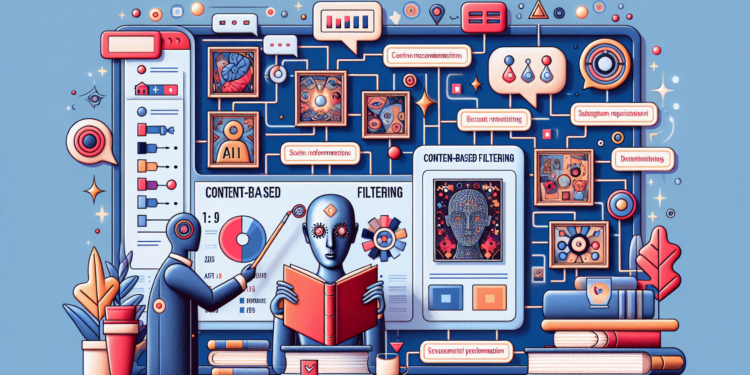Content-based filtering (CBF) is a recommendation approach that is built upon the description of an item and a user’s preference profile. This paradigm utilizes natural language processing (NLP) and machine learning (ML) techniques to recommend products or content that are highly relevant to a user. The user profile is constructed by gathering information associated with items that the user has positively rated in the past.
Vector Space Models and Semantic Relevance
Following the vector space semantic hypothesis, both items and user preferences are represented as vectors in a multidimensional space. The relevance between items and users is determined through the calculation of cosine similarity, which provides a measure of normalized similarity independent of the vectors’ magnitude, essential for prioritizing relevant content.
Evolution of Deep Learning
With the adoption of deep learning, content-based filtering models that use neural networks for more detailed and sophisticated analysis have emerged. Convolutional Neural Networks (CNNs), for example, have shown exceptional performance in extracting visual features for image-based recommendations, while Recurrent Neural Networks (RNNs) and attention networks are widely used for sequential text analysis.
Recent Advances in Algorithms and Predictive Models
Application of Transformers in CBF
Transformers, a class of models that implement attention mechanisms to capture global data contexts, have positioned themselves at the forefront of NLP. These models can identify extremely complex underlying patterns and offer superior performance in content-based textual filtering.
Personalization through Hybrid Models
For enhanced personalization, CBF systems are often complemented with collaborative filtering techniques. Hybrid models, such as those using matrix factorization, can capture both user-item interactions and the intrinsic characteristics of items, providing more accurate and robust recommendations.
Generative Models and Autoencoders
The use of generative models like Generative Adversarial Networks (GANs) and Variational Autoencoders (VAEs) has opened up new possibilities in terms of generating novel recommendations. These models can create new user profiles and items that do not yet exist in the dataset, expanding the recommendation space beyond observed examples.
Emerging Practical Applications and Case Studies
Multimedia Content Recommendations
Streaming platforms such as Netflix and Spotify use sophisticated CBF systems to recommend movies, series, and music. Netflix, in particular, has published studies about its approach, which includes the usage of model ensembles that integrate various data sources and recommendation methods to enhance user experience.
Content-Based Filtering in E-commerce
Amazon and other online retailers employ CBF to suggest products based on the characteristics of items viewed and purchased by the user. The inclusion of deep learning models has significantly improved the relevance of these recommendations, reflected in increased conversion rates.
Personalization of News and Articles
Applications like Google News implement CBF to curate personalized news feeds. These systems analyze not only the content of the news but also the reader’s behavior, dynamically tailoring recommendations as the user’s preferences and habits change.
Reflections on the Future and Potential Innovations
Integration of Reinforcement Learning
Reinforcement learning could play a key role in the future evolution of CBF, personalizing recommendations based on the user’s implicit or explicit feedback in a continuous learning approach.
Multimodal Fusion in Recommendations
An integrated multimodal approach is anticipated, combining text, images, audio, and video to provide a truly holistic and content-rich experience, leveraging the best of each individual content filtering approach.
Ethics and Transparency in CBF
Finally, the responsible implementation of CBF demands critical consideration of transparency and ethics. Understanding how recommendations are formed and ensuring that they do not perpetuate biases is an active research area that will continue to challenge the AI community.






















